英语八年级上册重点句型(Unit 2 Teams(4 Class Projects))-导学案-北师大版
文档属性
| 名称 | 英语八年级上册重点句型(Unit 2 Teams(4 Class Projects))-导学案-北师大版 |
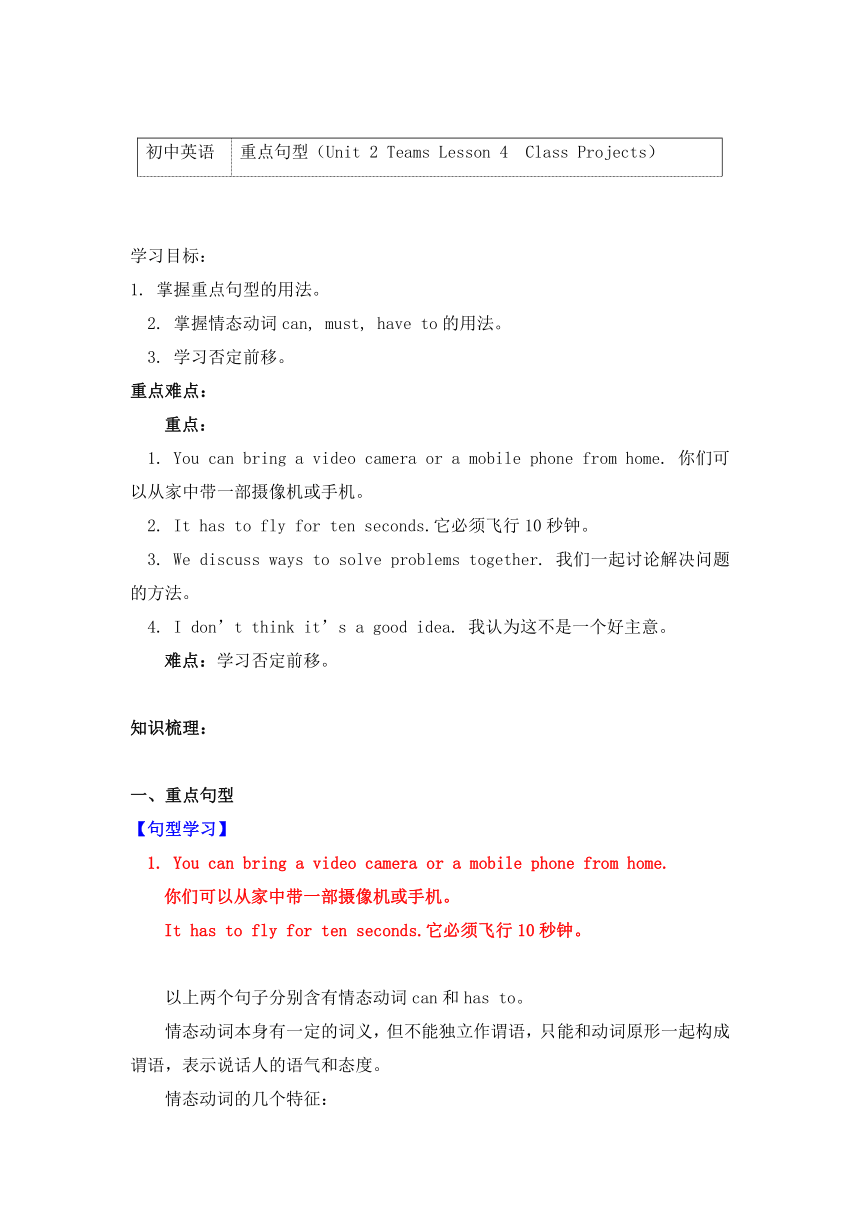
|
|
| 格式 | doc | ||
| 文件大小 | 90.9KB | ||
| 资源类型 | 教案 | ||
| 版本资源 | 北师大版 | ||
| 科目 | 英语 | ||
| 更新时间 | 2020-09-30 17:54:01 | ||
图片预览

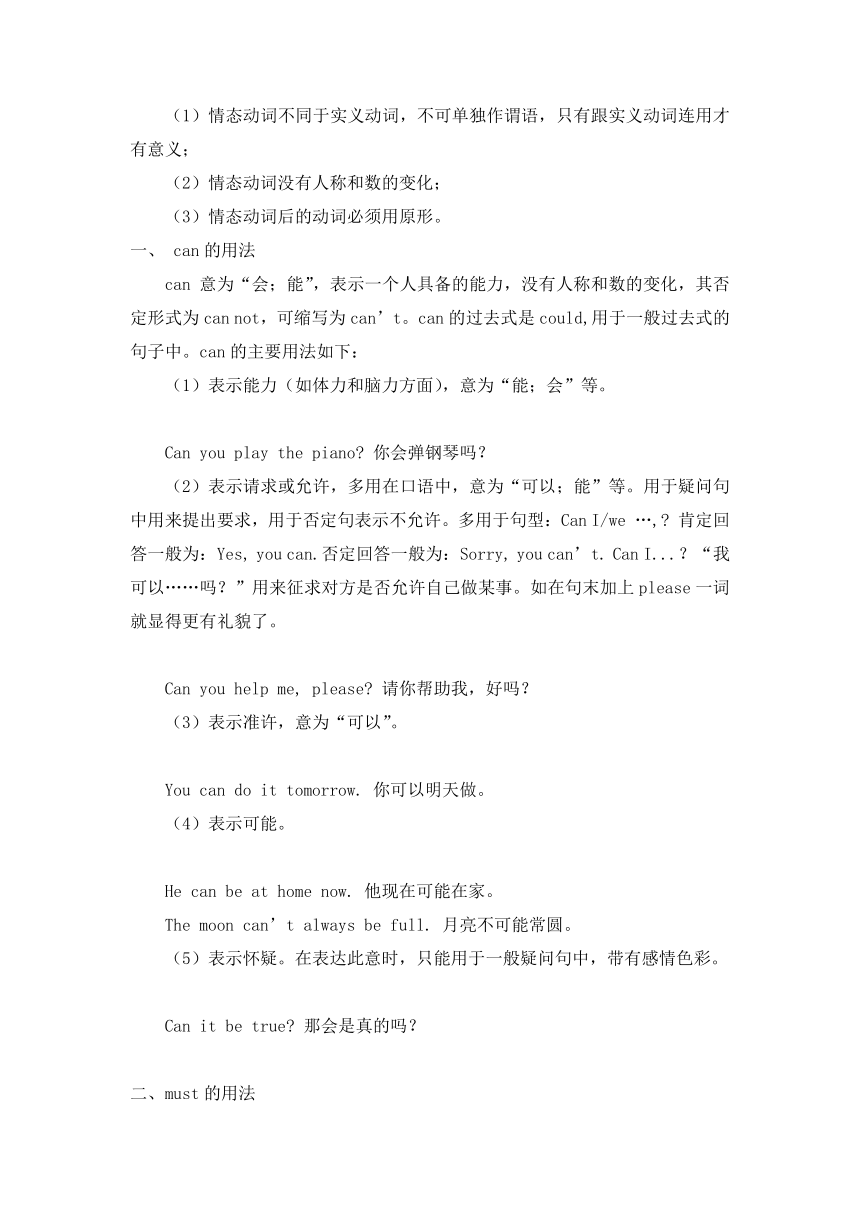
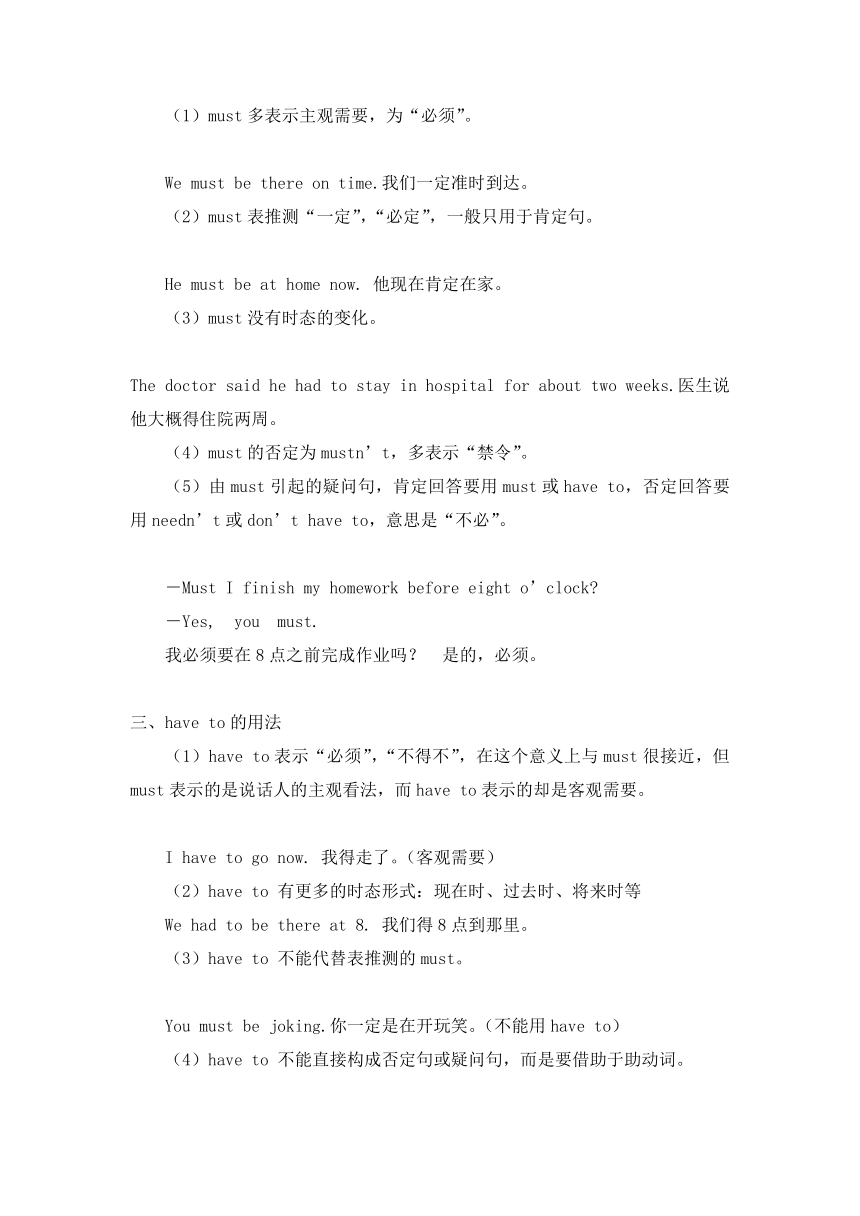
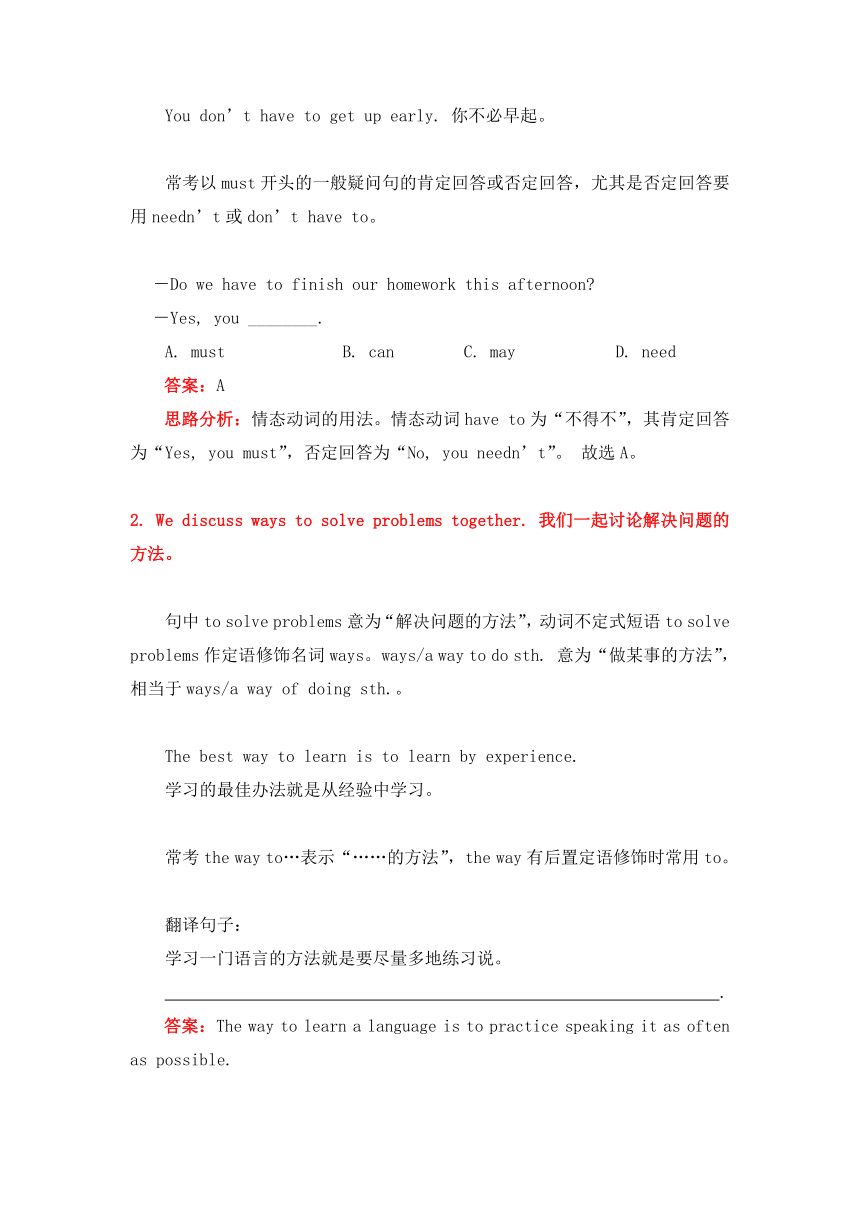
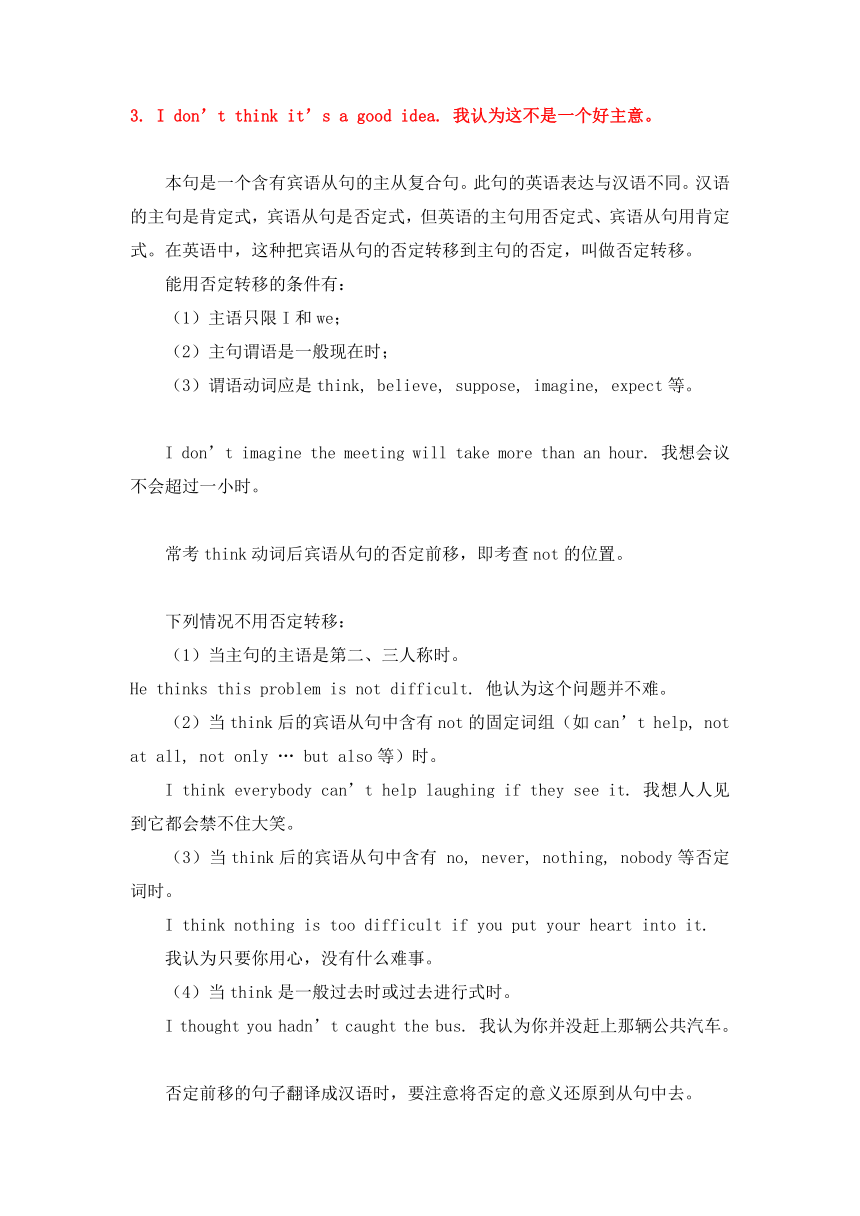
文档简介
初中英语 重点句型(Unit 2 Teams Lesson 4 Class Projects)
学习目标:
1. 掌握重点句型的用法。
2. 掌握情态动词can, must, have to的用法。
3. 学习否定前移。
重点难点:
重点:
1. You can bring a video camera or a mobile phone from home. 你们可以从家中带一部摄像机或手机。
2. It has to fly for ten seconds.它必须飞行10秒钟。
3. We discuss ways to solve problems together. 我们一起讨论解决问题的方法。
4. I don’t think it’s a good idea. 我认为这不是一个好主意。
难点:学习否定前移。
知识梳理:
一、重点句型
【句型学习】
1. You can bring a video camera or a mobile phone from home.
你们可以从家中带一部摄像机或手机。
It has to fly for ten seconds.它必须飞行10秒钟。
以上两个句子分别含有情态动词can和has to。
情态动词本身有一定的词义,但不能独立作谓语,只能和动词原形一起构成谓语,表示说话人的语气和态度。
情态动词的几个特征:
(1)情态动词不同于实义动词,不可单独作谓语,只有跟实义动词连用才有意义;
(2)情态动词没有人称和数的变化;
(3)情态动词后的动词必须用原形。
一、 can的用法
can 意为“会;能”,表示一个人具备的能力,没有人称和数的变化,其否定形式为can not,可缩写为can’t。can的过去式是could,用于一般过去式的句子中。can的主要用法如下:
(1)表示能力(如体力和脑力方面),意为“能;会”等。
Can you play the piano? 你会弹钢琴吗?
(2)表示请求或允许,多用在口语中,意为“可以;能”等。用于疑问句中用来提出要求,用于否定句表示不允许。多用于句型:Can I/we …,? 肯定回答一般为:Yes, you can.否定回答一般为:Sorry, you can’t. Can I...?“我可以……吗?”用来征求对方是否允许自己做某事。如在句末加上please一词就显得更有礼貌了。
Can you help me, please? 请你帮助我,好吗?
(3)表示准许,意为“可以”。
You can do it tomorrow. 你可以明天做。
(4)表示可能。
He can be at home now. 他现在可能在家。
The moon can’t always be full. 月亮不可能常圆。
(5)表示怀疑。在表达此意时,只能用于一般疑问句中,带有感彩。
Can it be true? 那会是真的吗?
二、must的用法
(1)must多表示主观需要,为“必须”。
We must be there on time.我们一定准时到达。
(2)must表推测“一定”,“必定”,一般只用于肯定句。
He must be at home now. 他现在肯定在家。
(3)must没有时态的变化。
The doctor said he had to stay in hospital for about two weeks.医生说他大概得住院两周。
(4)must的否定为mustn’t,多表示“禁令”。
(5)由must引起的疑问句,肯定回答要用must或have to,否定回答要用needn’t或don’t have to,意思是“不必”。
-Must I finish my homework before eight o’clock?
-Yes,?you?must.?
我必须要在8点之前完成作业吗??是的,必须。
三、have to的用法
(1)have to表示“必须”,“不得不”,在这个意义上与must很接近,但must表示的是说话人的主观看法,而have to表示的却是客观需要。
I have to go now. 我得走了。(客观需要)
(2)have to 有更多的时态形式:现在时、过去时、将来时等
We had to be there at 8. 我们得8点到那里。
(3)have to 不能代替表推测的must。
You must be joking.你一定是在开玩笑。(不能用have to)
(4)have to 不能直接构成否定句或疑问句,而是要借助于助动词。
You don’t have to get up early. 你不必早起。
常考以must开头的一般疑问句的肯定回答或否定回答,尤其是否定回答要用needn’t或don’t have to。
-Do we have to finish our homework this afternoon?
-Yes, you ________.
A. must B. can C. may D. need
答案:A
思路分析:情态动词的用法。情态动词have to为“不得不”,其肯定回答为“Yes, you must”,否定回答为“No, you needn’t”。 故选A。
2. We discuss ways to solve problems together. 我们一起讨论解决问题的方法。
句中to solve problems意为“解决问题的方法”,动词不定式短语to solve problems作定语修饰名词ways。ways/a way to do sth. 意为“做某事的方法”,相当于ways/a way of doing sth.。
The best way to learn is to learn by experience.
学习的最佳办法就是从经验中学习。
常考the way to…表示“……的方法”,the way有后置定语修饰时常用to。
翻译句子:
学习一门语言的方法就是要尽量多地练习说。
.
答案:The way to learn a language is to practice speaking it as often as possible.
3. I don’t think it’s a good idea. 我认为这不是一个好主意。
本句是一个含有宾语从句的主从复合句。此句的英语表达与汉语不同。汉语的主句是肯定式,宾语从句是否定式,但英语的主句用否定式、宾语从句用肯定式。在英语中,这种把宾语从句的否定转移到主句的否定,叫做否定转移。
能用否定转移的条件有:
(1)主语只限I和we;
(2)主句谓语是一般现在时;
(3)谓语动词应是think, believe, suppose, imagine, expect等。
I don’t imagine the meeting will take more than an hour. 我想会议不会超过一小时。
常考think动词后宾语从句的否定前移,即考查not的位置。
下列情况不用否定转移:
(1)当主句的主语是第二、三人称时。
He thinks this problem is not difficult. 他认为这个问题并不难。
(2)当think后的宾语从句中含有not的固定词组(如can’t help, not at all, not only … but also等)时。
I think everybody can’t help laughing if they see it. 我想人人见到它都会禁不住大笑。
(3)当think后的宾语从句中含有 no, never, nothing, nobody等否定词时。
I think nothing is too difficult if you put your heart into it.
我认为只要你用心,没有什么难事。
(4)当think是一般过去时或过去进行式时。
I thought you hadn’t caught the bus. 我认为你并没赶上那辆公共汽车。
否定前移的句子翻译成汉语时,要注意将否定的意义还原到从句中去。
同义句转换:
I don’t think you are right.
I don’t __ ___ __ _ __ you.
答案:agree with
即学即练:
**1. -Look at that girl! Is it Susan?
-No, it _______ be her. She has gone back to her hometown.
A. mustn’t B. can’t C. needn’t D. wouldn’t
答案:B
思路分析:情态动词的用法。句意:-看那个女孩!是苏珊吗?-不,不可能是她。她已经回她的家乡了。本题考查的是情态动词can的用法,在此题中表示对某件事情的推断,故本题选B。
**2. They never agree the way learn English.
A. with to B. about to C. with about D. about with
答案:B
思路分析:题意:关于学英语的方法,他们的意见总是不一致。 agree about sth.关于某事方面同意;the way to do sth. 做某事的方法。故选B。
**3. I he go there by himself.
A. think; won’t B. don’t think; will
C. don’t think; is D. think; isn’t going to
答案:B
思路分析:否定前移句。汉语中否定宾语从句,而在英语表达中要否定主句,而把宾语从句变成肯定句。句意:我认为他不会独自去那儿。故选B。
课文朗读
Class Project Rules
a. A Famous Building
Build a model of a famous building. You can use wood, paper and glue but you mustn’t use other things. You have to paint the model. Next class, you must describe your building but it doesn’t have to be long.
b. Musical Instruments
You must make two musical instruments with plastic bottles. You can’t use materials from toys or real instruments. In class, you have to play some music with the instruments for three minutes.
c. A Short Film
Make a film about your group. You can bring a video camera or a mobile phone from home. The film has to be in English. You can interview people in your group but their answers mustn’t be long. You must play the film in class and introduce your group in three minutes.
d. A Chopstick Plane
You must make a plane with two chopsticks. You can use paper and glue but you can’t use metal. You must test the plane in front of your teacher and your classmates in the playground. It has to fly for ten seconds.
同步练习:
(答题时间:20分钟)
一、单项选择
*1. You____ ____read that article if you don’t want to.
A. haven’t B. can’t C. mustn’t D. needn’t
2. I____ ___get this done immediately or it will be too late.
A. must B. can C. may D. might
3. You had better_____ _____a doctor as soon as possible.
A. seen B. saw C. see D. seeing
**4. Are you coming to Jeff’s party?
I’m not sure. I _________ go to the concert instead.
A. must B. would C. should D. might
*5. Will you stay for lunch?
Sorry.___________.My brother is coming to see me.
A. I mustn’t B. I can’t C. I needn’t D. I won’t
**6. I heard they went skiing in the mountains last winter.
It _____ _____ true because there was little snow there.
A. may not be B. won’t be C. couldn’t be D. mustn’t be
**7. Someone is coming here.Who___________ it be?
A. will B. shall C. must D. can
**8. -May I stop here?
-No,you_________.
A. mustn’t B. might not C. needn’t D. won’t
二、连词成句
1. model, to, paint, the, have, you
.
2. must, bottles, musical, with, plastic, two, make, must, you, instruments
.
3. group, can, people, in, your, you, interview
.
4. must, make, chopsticks, you, a, with, plane, two
.
5. teacher, in , test, you , front, your , of, must, the , plane
.
三、阅读理解
A
There are 45 students in our class. I have made a survey, 36 students say they like to exercise. Most boys play basketball together twice a week. But girls think basketball is difficult for them, they’d like to play volleyball together twice a week. My friend, Tonny, is good at running. He runs fastest(最快)in our class. He runs for 30 minutes on the playground every evening before he goes to bed. Is it interesting? Gray is good at swimming. He goes to the swimming club three times a month in winter and three times a week in summer. So he’s pretty healthy. Some of my classmates have good eating habits. They eat both meat and vegetables. 70% of them drink milk every day. 15 students say they drink milk three or four times a week. But some students like to eat junk food, especially Sally. What’s worse(更糟糕的)is that she doesn’t like to exercise, so she is very fat. She always says “ I’m going to lose weight tomorrow.”
1. How often do most boys play basketball? ______
A. Every day. B. Twice a day.
C. Twice a week. D. Twice a month.
2. Why do the girls dislike to play basketball? ______
A. Because they have no time.
B. Because they think it’s not easy.
C. Because they don’t like to play with the boys.
D. Because they don’t like to exercise.
3. When does Tonny often run for 30 minutes? ______
A. Every morning. B. Every evening.
C. Every evening before he goes to bed. D. Every afternoon.
4. How often does Gray swim in winter? ______
A. Three times a month. B. Three times a week.
C. Hardly ever. D. It’s not mentioned(提到)in the passage.
5. Why is Sally so fat? ______
A. Because she doesn’t like to exercise.
B. Because she likes to eat junk food every much.
C. Because she eats too much meat, but doesn’t exercise.
D. Both A and B.
B
A hungry fox is looking for something to eat. He sees a frog(青蛙)playing near the river, He goes up to the frog and is going to eat it.
Just at that time a tortoise(乌龟)comes up and sees all this. He goes up quickly and bites(咬)the fox’s tail(尾巴).The fox can’t move and the frog jumps into the river. “I’ m going to throw you into the sky.” says the fox angrily to the tortoise.” “Thank you. I’m always hoping to go into the sky,” says the tortoise. “I’m going to throw you into the fire” says the fox again to the tortoise. “Thank you very much. I’m very cold and want to keep warm,” the tortoise says. “Don’t throw me into the river. I’m afraid of water very much,” says the tortoise in tears. When he hears this, the fox gets up and throws the tortoise into the river. Now the tortoise is swimming in the river happily and laughing at the fox.
1. The fox wants__ __.
A. to drink water B. to play with the frog
C. to eat the frog D. to swim
2. Does the tortoise really want to fly?
A. Yes, he does. B. No, he doesn’t.
C. The fox does. D .Both do.
3. The fox’s tail is bitten by (被……咬) __ ___.
A .itself B. the hare C. the frog D. the tortoise
4. The tortoise is _____ to be in water again.
A. glad B. sorry C. sad D. surprised
5. There are _ ___ animals in this story.
A. two B. one C. three D. four
C
In China, many people like watching TV. Watching TV is one of the most important activities of the day. TV brings the outside closer (close adv.接近地) to people’s homes. Some people say the world is smaller than before—because of TV.
What’s going on(发生)in the other countries? How do people live in places far away? Is there a good sports game somewhere? What’s life in the deepest part of the sea?
If you want to answer these and other kinds of questions,just turn on the TV. Turn it on and watch. You can see a lot and learn a lot. Of course, people can also learn through reading or listening to the radio. But with TV they can learn better and more easily. Why? Because they can hear and watch, too.
TV helps to open our eyes. TV also helps to open our minds. TV often gives us new ideas. We learn newer and better ways of doing something.
1. Some people say the world is smaller than before because .
A.TV makes the earth smaller and smaller
B. all people like to watch TV
C. watching TV is one of the most important activities of the day
D.TV brings the outside world closer to people
2. We can when we watch TV.
A. go to live in the other countries
B. answer TV many questions
C. get a lot of information
D. ask TV some questions
3. People learn better through TV than radio because .
A. TV sets are bigger than radios
B. people can not only hear but also watch
C. without TV people can’t open their eyes
D. it’s easier to turn on TV than to turn on the radio
4. The sentence “TV also helps to open our minds’ means .
A. our minds can not only be opened by TV
B. something is wrong with our minds
C. we can learn more with TV than without TV
D.TV is new to us
5. This article has told us .
A. it’s good to watch TV
B. not to watch TV any more
C. students shouldn’t watch TV at any time
D. to stop reading to watch TV
答案:
一、单项选择
1. D 解析:句意:如果你不想,你不必读那篇文章。A表示“没有读”,B表示“不能读”,C表示“一定不能读”,显然都不符合句意。选D,意为“不必读”。
2. A 解析:句意:我必须把这件事立即做完,否则就太晚了。B表示“能”,C表示“可以”,D表示“也许”,意思都不对。
3. C 解析:had better do表示“最好做某事”,选C。
4. D 解析:既然是I’m not sure.(我不能确定)那么后面应该是“我也许会去干什么”。“也许”应该用might。这里,might不是may的过去式,只是表示更不太可能发生的事。选D。
5. B 解析:根据语境“我的哥哥要来看我”说明“不是我不愿意,而是我不能那样做”。再者,当will用于第二人称提问的问句中,表达的是一种请求,其肯定回答可用sure/certainly/I’d be glad to等;否定回答常是I’m sorry I can’t.I’d like to,but…等。选B。
6. C 解析:根据句意,这是对“过去不可能去滑雪”的推测,应该用couldn’t,表示否定推测“不可能”。选C。
7. D 解析:句意:有人朝这边走来了。可能是谁呢?表示推测,又是在疑问句中,用can,选D。注意:must表推测用在肯定句中。
8. A 解析:may开头的疑问句,否定回答常用mustn’t,表示“一定不行”,语气很强,选A。
二、连词成句
1. You have to paint the model
5. You must make two musical instruments with plastic bottles
3. You can interview people in your group
4. You must make a plane with two chopsticks
2. You must test the plane in front of your teacher
三、阅读理解
A
1. C 解析:根据句子“Most boys play basketball together twice a week”可知答案C。
2. B 解析:根据句子“girls think basketball is difficult for them”和difficult意思 (not easy) 可知答案为B。
3. C 解析:根据句子“He runs for 30 minutes on the playground every evening before he goes to bed”可知答案为C。
4. A 解析:根据句子“He goes to the swimming club three times a month in winter”可知答案为A。
5. D 解析:根据句子“some students like to eat junk food, especially Sally. What’s worse is that she doesn’t like to exercise, so she is very fat”可知答案为D。
B
1. C 解析:根据第一段的内容可知答案为C。
2. B 解析:根据生活常识可作出回答B。
3. D 解析:根据第二段的句子“Just at that time a tortoise comes up and sees all this. He goes up quickly and bites the fox’s tail.”可知答案为D。
4. A 解析:根据生活常识和短文最后的句子“Now the tortoise is swimming in the river happily and laughing at the fox”可推断出答案为A。
5. C 解析:在文章中提到的动物有:fox, frog and tortoise,故答案为C。
C
1. D 解析:根据第一段的句子“TV brings the outside closer (close adv.接近地) to people’s homes. Some people say the world is smaller than before — because of TV”,可知答案为D。
2. C 解析:根据第三段的句子“You can see a lot and learn a lot”和对整篇文章的理解,可推断出答案为C。
3. B 解析:根据第三段最后一句话“Because they can hear and watch, too.”可得出答案B。
4. C 解析:根据第四段的句子“TV often gives us new ideas. We learn newer and better ways of doing something. ”可知答案为C。
5. A 解析:根据日常生活常识和对整篇课文的理解,推断出答案A。
学习目标:
1. 掌握重点句型的用法。
2. 掌握情态动词can, must, have to的用法。
3. 学习否定前移。
重点难点:
重点:
1. You can bring a video camera or a mobile phone from home. 你们可以从家中带一部摄像机或手机。
2. It has to fly for ten seconds.它必须飞行10秒钟。
3. We discuss ways to solve problems together. 我们一起讨论解决问题的方法。
4. I don’t think it’s a good idea. 我认为这不是一个好主意。
难点:学习否定前移。
知识梳理:
一、重点句型
【句型学习】
1. You can bring a video camera or a mobile phone from home.
你们可以从家中带一部摄像机或手机。
It has to fly for ten seconds.它必须飞行10秒钟。
以上两个句子分别含有情态动词can和has to。
情态动词本身有一定的词义,但不能独立作谓语,只能和动词原形一起构成谓语,表示说话人的语气和态度。
情态动词的几个特征:
(1)情态动词不同于实义动词,不可单独作谓语,只有跟实义动词连用才有意义;
(2)情态动词没有人称和数的变化;
(3)情态动词后的动词必须用原形。
一、 can的用法
can 意为“会;能”,表示一个人具备的能力,没有人称和数的变化,其否定形式为can not,可缩写为can’t。can的过去式是could,用于一般过去式的句子中。can的主要用法如下:
(1)表示能力(如体力和脑力方面),意为“能;会”等。
Can you play the piano? 你会弹钢琴吗?
(2)表示请求或允许,多用在口语中,意为“可以;能”等。用于疑问句中用来提出要求,用于否定句表示不允许。多用于句型:Can I/we …,? 肯定回答一般为:Yes, you can.否定回答一般为:Sorry, you can’t. Can I...?“我可以……吗?”用来征求对方是否允许自己做某事。如在句末加上please一词就显得更有礼貌了。
Can you help me, please? 请你帮助我,好吗?
(3)表示准许,意为“可以”。
You can do it tomorrow. 你可以明天做。
(4)表示可能。
He can be at home now. 他现在可能在家。
The moon can’t always be full. 月亮不可能常圆。
(5)表示怀疑。在表达此意时,只能用于一般疑问句中,带有感彩。
Can it be true? 那会是真的吗?
二、must的用法
(1)must多表示主观需要,为“必须”。
We must be there on time.我们一定准时到达。
(2)must表推测“一定”,“必定”,一般只用于肯定句。
He must be at home now. 他现在肯定在家。
(3)must没有时态的变化。
The doctor said he had to stay in hospital for about two weeks.医生说他大概得住院两周。
(4)must的否定为mustn’t,多表示“禁令”。
(5)由must引起的疑问句,肯定回答要用must或have to,否定回答要用needn’t或don’t have to,意思是“不必”。
-Must I finish my homework before eight o’clock?
-Yes,?you?must.?
我必须要在8点之前完成作业吗??是的,必须。
三、have to的用法
(1)have to表示“必须”,“不得不”,在这个意义上与must很接近,但must表示的是说话人的主观看法,而have to表示的却是客观需要。
I have to go now. 我得走了。(客观需要)
(2)have to 有更多的时态形式:现在时、过去时、将来时等
We had to be there at 8. 我们得8点到那里。
(3)have to 不能代替表推测的must。
You must be joking.你一定是在开玩笑。(不能用have to)
(4)have to 不能直接构成否定句或疑问句,而是要借助于助动词。
You don’t have to get up early. 你不必早起。
常考以must开头的一般疑问句的肯定回答或否定回答,尤其是否定回答要用needn’t或don’t have to。
-Do we have to finish our homework this afternoon?
-Yes, you ________.
A. must B. can C. may D. need
答案:A
思路分析:情态动词的用法。情态动词have to为“不得不”,其肯定回答为“Yes, you must”,否定回答为“No, you needn’t”。 故选A。
2. We discuss ways to solve problems together. 我们一起讨论解决问题的方法。
句中to solve problems意为“解决问题的方法”,动词不定式短语to solve problems作定语修饰名词ways。ways/a way to do sth. 意为“做某事的方法”,相当于ways/a way of doing sth.。
The best way to learn is to learn by experience.
学习的最佳办法就是从经验中学习。
常考the way to…表示“……的方法”,the way有后置定语修饰时常用to。
翻译句子:
学习一门语言的方法就是要尽量多地练习说。
.
答案:The way to learn a language is to practice speaking it as often as possible.
3. I don’t think it’s a good idea. 我认为这不是一个好主意。
本句是一个含有宾语从句的主从复合句。此句的英语表达与汉语不同。汉语的主句是肯定式,宾语从句是否定式,但英语的主句用否定式、宾语从句用肯定式。在英语中,这种把宾语从句的否定转移到主句的否定,叫做否定转移。
能用否定转移的条件有:
(1)主语只限I和we;
(2)主句谓语是一般现在时;
(3)谓语动词应是think, believe, suppose, imagine, expect等。
I don’t imagine the meeting will take more than an hour. 我想会议不会超过一小时。
常考think动词后宾语从句的否定前移,即考查not的位置。
下列情况不用否定转移:
(1)当主句的主语是第二、三人称时。
He thinks this problem is not difficult. 他认为这个问题并不难。
(2)当think后的宾语从句中含有not的固定词组(如can’t help, not at all, not only … but also等)时。
I think everybody can’t help laughing if they see it. 我想人人见到它都会禁不住大笑。
(3)当think后的宾语从句中含有 no, never, nothing, nobody等否定词时。
I think nothing is too difficult if you put your heart into it.
我认为只要你用心,没有什么难事。
(4)当think是一般过去时或过去进行式时。
I thought you hadn’t caught the bus. 我认为你并没赶上那辆公共汽车。
否定前移的句子翻译成汉语时,要注意将否定的意义还原到从句中去。
同义句转换:
I don’t think you are right.
I don’t __ ___ __ _ __ you.
答案:agree with
即学即练:
**1. -Look at that girl! Is it Susan?
-No, it _______ be her. She has gone back to her hometown.
A. mustn’t B. can’t C. needn’t D. wouldn’t
答案:B
思路分析:情态动词的用法。句意:-看那个女孩!是苏珊吗?-不,不可能是她。她已经回她的家乡了。本题考查的是情态动词can的用法,在此题中表示对某件事情的推断,故本题选B。
**2. They never agree the way learn English.
A. with to B. about to C. with about D. about with
答案:B
思路分析:题意:关于学英语的方法,他们的意见总是不一致。 agree about sth.关于某事方面同意;the way to do sth. 做某事的方法。故选B。
**3. I he go there by himself.
A. think; won’t B. don’t think; will
C. don’t think; is D. think; isn’t going to
答案:B
思路分析:否定前移句。汉语中否定宾语从句,而在英语表达中要否定主句,而把宾语从句变成肯定句。句意:我认为他不会独自去那儿。故选B。
课文朗读
Class Project Rules
a. A Famous Building
Build a model of a famous building. You can use wood, paper and glue but you mustn’t use other things. You have to paint the model. Next class, you must describe your building but it doesn’t have to be long.
b. Musical Instruments
You must make two musical instruments with plastic bottles. You can’t use materials from toys or real instruments. In class, you have to play some music with the instruments for three minutes.
c. A Short Film
Make a film about your group. You can bring a video camera or a mobile phone from home. The film has to be in English. You can interview people in your group but their answers mustn’t be long. You must play the film in class and introduce your group in three minutes.
d. A Chopstick Plane
You must make a plane with two chopsticks. You can use paper and glue but you can’t use metal. You must test the plane in front of your teacher and your classmates in the playground. It has to fly for ten seconds.
同步练习:
(答题时间:20分钟)
一、单项选择
*1. You____ ____read that article if you don’t want to.
A. haven’t B. can’t C. mustn’t D. needn’t
2. I____ ___get this done immediately or it will be too late.
A. must B. can C. may D. might
3. You had better_____ _____a doctor as soon as possible.
A. seen B. saw C. see D. seeing
**4. Are you coming to Jeff’s party?
I’m not sure. I _________ go to the concert instead.
A. must B. would C. should D. might
*5. Will you stay for lunch?
Sorry.___________.My brother is coming to see me.
A. I mustn’t B. I can’t C. I needn’t D. I won’t
**6. I heard they went skiing in the mountains last winter.
It _____ _____ true because there was little snow there.
A. may not be B. won’t be C. couldn’t be D. mustn’t be
**7. Someone is coming here.Who___________ it be?
A. will B. shall C. must D. can
**8. -May I stop here?
-No,you_________.
A. mustn’t B. might not C. needn’t D. won’t
二、连词成句
1. model, to, paint, the, have, you
.
2. must, bottles, musical, with, plastic, two, make, must, you, instruments
.
3. group, can, people, in, your, you, interview
.
4. must, make, chopsticks, you, a, with, plane, two
.
5. teacher, in , test, you , front, your , of, must, the , plane
.
三、阅读理解
A
There are 45 students in our class. I have made a survey, 36 students say they like to exercise. Most boys play basketball together twice a week. But girls think basketball is difficult for them, they’d like to play volleyball together twice a week. My friend, Tonny, is good at running. He runs fastest(最快)in our class. He runs for 30 minutes on the playground every evening before he goes to bed. Is it interesting? Gray is good at swimming. He goes to the swimming club three times a month in winter and three times a week in summer. So he’s pretty healthy. Some of my classmates have good eating habits. They eat both meat and vegetables. 70% of them drink milk every day. 15 students say they drink milk three or four times a week. But some students like to eat junk food, especially Sally. What’s worse(更糟糕的)is that she doesn’t like to exercise, so she is very fat. She always says “ I’m going to lose weight tomorrow.”
1. How often do most boys play basketball? ______
A. Every day. B. Twice a day.
C. Twice a week. D. Twice a month.
2. Why do the girls dislike to play basketball? ______
A. Because they have no time.
B. Because they think it’s not easy.
C. Because they don’t like to play with the boys.
D. Because they don’t like to exercise.
3. When does Tonny often run for 30 minutes? ______
A. Every morning. B. Every evening.
C. Every evening before he goes to bed. D. Every afternoon.
4. How often does Gray swim in winter? ______
A. Three times a month. B. Three times a week.
C. Hardly ever. D. It’s not mentioned(提到)in the passage.
5. Why is Sally so fat? ______
A. Because she doesn’t like to exercise.
B. Because she likes to eat junk food every much.
C. Because she eats too much meat, but doesn’t exercise.
D. Both A and B.
B
A hungry fox is looking for something to eat. He sees a frog(青蛙)playing near the river, He goes up to the frog and is going to eat it.
Just at that time a tortoise(乌龟)comes up and sees all this. He goes up quickly and bites(咬)the fox’s tail(尾巴).The fox can’t move and the frog jumps into the river. “I’ m going to throw you into the sky.” says the fox angrily to the tortoise.” “Thank you. I’m always hoping to go into the sky,” says the tortoise. “I’m going to throw you into the fire” says the fox again to the tortoise. “Thank you very much. I’m very cold and want to keep warm,” the tortoise says. “Don’t throw me into the river. I’m afraid of water very much,” says the tortoise in tears. When he hears this, the fox gets up and throws the tortoise into the river. Now the tortoise is swimming in the river happily and laughing at the fox.
1. The fox wants__ __.
A. to drink water B. to play with the frog
C. to eat the frog D. to swim
2. Does the tortoise really want to fly?
A. Yes, he does. B. No, he doesn’t.
C. The fox does. D .Both do.
3. The fox’s tail is bitten by (被……咬) __ ___.
A .itself B. the hare C. the frog D. the tortoise
4. The tortoise is _____ to be in water again.
A. glad B. sorry C. sad D. surprised
5. There are _ ___ animals in this story.
A. two B. one C. three D. four
C
In China, many people like watching TV. Watching TV is one of the most important activities of the day. TV brings the outside closer (close adv.接近地) to people’s homes. Some people say the world is smaller than before—because of TV.
What’s going on(发生)in the other countries? How do people live in places far away? Is there a good sports game somewhere? What’s life in the deepest part of the sea?
If you want to answer these and other kinds of questions,just turn on the TV. Turn it on and watch. You can see a lot and learn a lot. Of course, people can also learn through reading or listening to the radio. But with TV they can learn better and more easily. Why? Because they can hear and watch, too.
TV helps to open our eyes. TV also helps to open our minds. TV often gives us new ideas. We learn newer and better ways of doing something.
1. Some people say the world is smaller than before because .
A.TV makes the earth smaller and smaller
B. all people like to watch TV
C. watching TV is one of the most important activities of the day
D.TV brings the outside world closer to people
2. We can when we watch TV.
A. go to live in the other countries
B. answer TV many questions
C. get a lot of information
D. ask TV some questions
3. People learn better through TV than radio because .
A. TV sets are bigger than radios
B. people can not only hear but also watch
C. without TV people can’t open their eyes
D. it’s easier to turn on TV than to turn on the radio
4. The sentence “TV also helps to open our minds’ means .
A. our minds can not only be opened by TV
B. something is wrong with our minds
C. we can learn more with TV than without TV
D.TV is new to us
5. This article has told us .
A. it’s good to watch TV
B. not to watch TV any more
C. students shouldn’t watch TV at any time
D. to stop reading to watch TV
答案:
一、单项选择
1. D 解析:句意:如果你不想,你不必读那篇文章。A表示“没有读”,B表示“不能读”,C表示“一定不能读”,显然都不符合句意。选D,意为“不必读”。
2. A 解析:句意:我必须把这件事立即做完,否则就太晚了。B表示“能”,C表示“可以”,D表示“也许”,意思都不对。
3. C 解析:had better do表示“最好做某事”,选C。
4. D 解析:既然是I’m not sure.(我不能确定)那么后面应该是“我也许会去干什么”。“也许”应该用might。这里,might不是may的过去式,只是表示更不太可能发生的事。选D。
5. B 解析:根据语境“我的哥哥要来看我”说明“不是我不愿意,而是我不能那样做”。再者,当will用于第二人称提问的问句中,表达的是一种请求,其肯定回答可用sure/certainly/I’d be glad to等;否定回答常是I’m sorry I can’t.I’d like to,but…等。选B。
6. C 解析:根据句意,这是对“过去不可能去滑雪”的推测,应该用couldn’t,表示否定推测“不可能”。选C。
7. D 解析:句意:有人朝这边走来了。可能是谁呢?表示推测,又是在疑问句中,用can,选D。注意:must表推测用在肯定句中。
8. A 解析:may开头的疑问句,否定回答常用mustn’t,表示“一定不行”,语气很强,选A。
二、连词成句
1. You have to paint the model
5. You must make two musical instruments with plastic bottles
3. You can interview people in your group
4. You must make a plane with two chopsticks
2. You must test the plane in front of your teacher
三、阅读理解
A
1. C 解析:根据句子“Most boys play basketball together twice a week”可知答案C。
2. B 解析:根据句子“girls think basketball is difficult for them”和difficult意思 (not easy) 可知答案为B。
3. C 解析:根据句子“He runs for 30 minutes on the playground every evening before he goes to bed”可知答案为C。
4. A 解析:根据句子“He goes to the swimming club three times a month in winter”可知答案为A。
5. D 解析:根据句子“some students like to eat junk food, especially Sally. What’s worse is that she doesn’t like to exercise, so she is very fat”可知答案为D。
B
1. C 解析:根据第一段的内容可知答案为C。
2. B 解析:根据生活常识可作出回答B。
3. D 解析:根据第二段的句子“Just at that time a tortoise comes up and sees all this. He goes up quickly and bites the fox’s tail.”可知答案为D。
4. A 解析:根据生活常识和短文最后的句子“Now the tortoise is swimming in the river happily and laughing at the fox”可推断出答案为A。
5. C 解析:在文章中提到的动物有:fox, frog and tortoise,故答案为C。
C
1. D 解析:根据第一段的句子“TV brings the outside closer (close adv.接近地) to people’s homes. Some people say the world is smaller than before — because of TV”,可知答案为D。
2. C 解析:根据第三段的句子“You can see a lot and learn a lot”和对整篇文章的理解,可推断出答案为C。
3. B 解析:根据第三段最后一句话“Because they can hear and watch, too.”可得出答案B。
4. C 解析:根据第四段的句子“TV often gives us new ideas. We learn newer and better ways of doing something. ”可知答案为C。
5. A 解析:根据日常生活常识和对整篇课文的理解,推断出答案A。
同课章节目录
- Unit 1 Television
- Lesson 1 Last Week on TV
- Lesson 2 An Interview on TV
- Lesson 3 The Big Game
- Communication Workshop
- Unit 2 Teams
- Lesson 4 Class Projects
- Lesson 5 Teamwork
- Lesson 6 A Special Team
- Communication Workshop
- Unit 3 Faster,Higher,Stronge
- Lesson 7 Time to Exercise
- Lesson 8 Olympic Winners
- Lesson 9 Never Give Up!
- Communication Workshop
- Unit 4 Healthy Living
- Lesson 10 Going to the Doctor
- Lesson 11 Health Advice
- Lesson 12 Healthy Bones
- Communication Workshop
- Unit 5 Helping
- Lesson 13 Helping Your Community
- Lesson 14 Helping Each Other
- Lesson 15 A Young Hero
- Communication Workshop
- Unit 6 The Unexplained
- Lesson 16 Natural Abilities
- Lesson 17 True Stories?
- Lesson 18 Dreams
- Communication Workshop
